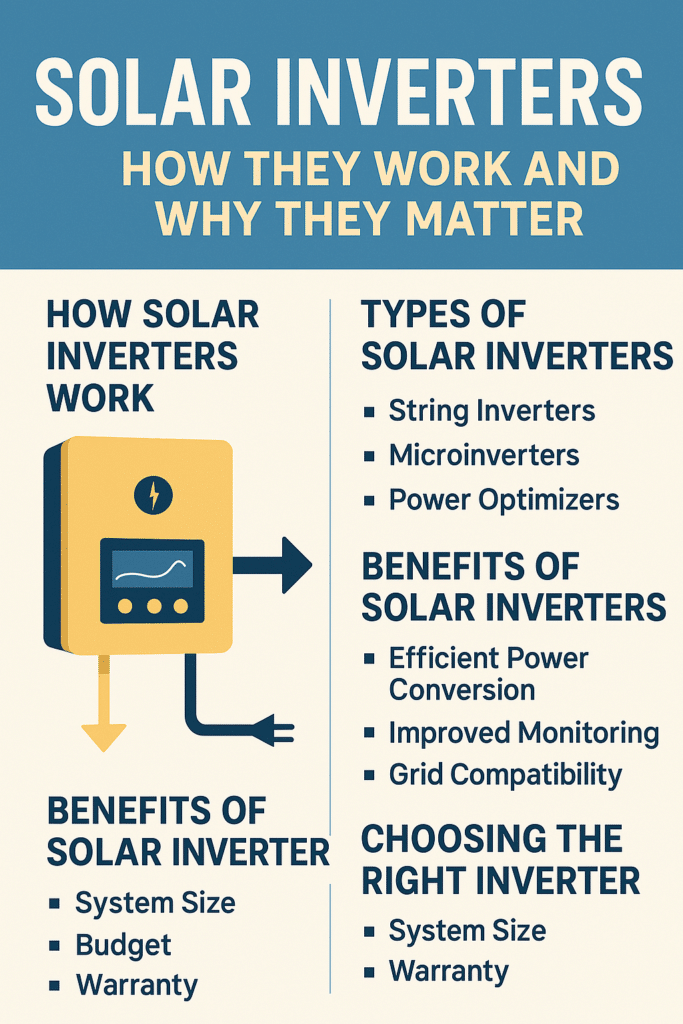📦 Fast Delivery – Order Now!
💸 Shop Safely – 100% Money-Back Guarantee
👨🔧 Lifetime Customer Support
Solar inverters play a crucial role in any solar energy system. While solar panels generate electricity, inverters ensure that the power can actually be used in your home or business. Understanding how inverters work and selecting the right one can maximize your system’s efficiency and savings.
Solar panels generate direct current (DC) electricity, but most homes and businesses use alternating current (AC). The inverter’s job is to convert DC into AC so that your appliances and electrical devices can use the power effectively. Here’s how the process works:

When selecting an inverter, consider these key factors:
If you’re installing a solar energy system, choosing the right inverter is just as important as selecting the right panels. A high-quality inverter can boost efficiency, reduce energy waste, and increase overall savings.

Looking for the perfect inverter for your solar setup? Browse our selection of top-rated inverters or contact us for expert advice on the best option for your needs!
AceFlex LLC is your trusted online store for solar solutions, specializing in premium solar kits and components. Based in St. Petersburg, FL, we operate through an efficient dropshipping model, ensuring competitive prices and fast delivery across the USA. With a 14-day return policy and secure payment options via PayPal, Stripe, and credit card, we make your transition to solar energy hassle-free.

Solar inverters convert the DC (direct current) electricity generated by solar panels into AC (alternating current), which is used to power most household appliances. They also ensure the system operates efficiently and safely by monitoring performance and optimizing energy output.
One common issue with solar inverters is failure to convert energy efficiently due to technical faults, such as overheating, or malfunctioning components. Inverter failures can also occur because of poor installation or aging components.
The best type of inverter depends on your system and needs. String inverters are common for standard installations, while microinverters or power optimizers are better for systems with shading or roof irregularities. Hybrid inverters are ideal for systems with energy storage.
Solar inverters can be costly, require regular maintenance, and can have a limited lifespan of about 10-15 years. They are also vulnerable to failure from environmental factors such as high temperatures, which may reduce their efficiency over time.
Yes, you should leave your solar inverter on all the time. It is designed to operate continuously to monitor and manage the solar power system. Turning it off might cause energy loss or disrupt the system’s ability to optimize performance.
Yes, all solar systems need an inverter. Without an inverter, the electricity generated by the solar panels (DC) cannot be converted into usable AC power for household use or for feeding into the grid.
The size of your solar inverter should match the capacity of your solar panel system. Typically, an inverter should have a power rating of about 1.2 to 1.5 times the wattage of your solar panel array to ensure optimal performance and avoid overload.
Solar inverters synchronize with the grid by matching the grid’s frequency and voltage. They use a process called grid-tie synchronization to ensure the electricity produced by the solar system is compatible with the power being supplied to the grid.
The main types of solar inverters are string inverters, microinverters, power optimizers, and hybrid inverters. Each has its advantages depending on system size, efficiency, and specific needs like shading or energy storage.
Yes, solar inverters require a power supply to operate. They draw a small amount of power from the solar panels themselves to function, but the system still relies on a grid connection for proper operation and monitoring.
The average lifespan of a solar inverter is typically 10 to 15 years. However, some high-quality inverters can last up to 20 years with proper maintenance, while others may need to be replaced sooner.
The main causes of inverter failure are typically overheating, electrical faults, and age-related wear and tear. Inadequate ventilation, improper installation, or exposure to extreme weather conditions can also shorten the inverter’s lifespan.
AceFlex is one of the leading online retailers of renewable energy products and offers a wide range of solar products. We work with well-known manufacturers and wholesalers and can offer you cost-effective products in the field of photovoltaics so that you too can contribute to the energy transition.
Looking for an experienced team for planning your photovoltaic system without the hassle of doing it yourself? We are your trusted partner, offering comprehensive nationwide solutions. We provide expert consultation and supply of both photovoltaic systems and storage units tailored to your specific needs.
© 2025 Aceflex All Rights Reserved. Design by Media Pantheon, Inc.





